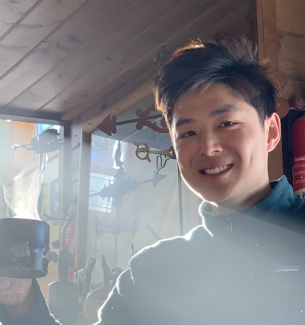Yunzhe “Oliver” Shao, a graduate student at JILA in the group led by JILA Fellows and University of Colorado Boulder Physics professors Margaret Murnane and Henry Kapteyn, has been awarded the Best Paper Award at the IEEE Conference on Computational Imaging Using Synthetic Apertures.
Shao's winning research focused on developing an extreme ultraviolet (EUV) reflectometer. This innovative instrument is designed to characterize various nanostructured samples' chemical compositions and spatial properties.
"This research represents a first-iteration, proof-of-concept instrumentation for nanostructure metrology," Shao explained. "It has been constructed, developed, and improved over several generations of graduate students in our group. It is reassuring and inspiring to share its new capabilities and witness the interest it generates from the metrology community."
The paper was submitted to the 2024 IEEE Conference on Computational Imaging Using Synthetic Apertures, created in partnership with and hosted by NIST (the National Institute of Standards and Technology). The annual event highlights advancements in cutting-edge computer imaging and sensing using high-resolution imaging systems, like the reflectometer Shao and the KM group work on.
Shao expressed gratitude for the recognition, highlighting the collective effort behind the project. "Apart from its founding members, whose names are listed in several previous publications, the reflectometer does not exist without the continuing efforts of current students and postdocs from our group, including Nick Jenkins, Clay Klein, Yunhao Li, and Jiayi Liu. We are motivated to further develop and improve this metrology instrument beyond its current limitations."
Written by Kenna Hughes-Castleberry, JILA Science Communicator



 The Physics Frontiers Centers (PFC) program supports university-based centers and institutes where the collective efforts of a larger group of individuals can enable transformational advances in the most promising research areas. The program is designed to foster major breakthroughs at the intellectual frontiers of physics by providing needed resources such as combinations of talents, skills, disciplines, and/or specialized infrastructure, not usually available to individual investigators or small groups, in an environment in which the collective efforts of the larger group can be shown to be seminal to promoting significant progress in the science and the education of students. PFCs also include creative, substantive activities aimed at enhancing education, broadening participation of traditionally underrepresented groups, and outreach to the scientific community and general public.
The Physics Frontiers Centers (PFC) program supports university-based centers and institutes where the collective efforts of a larger group of individuals can enable transformational advances in the most promising research areas. The program is designed to foster major breakthroughs at the intellectual frontiers of physics by providing needed resources such as combinations of talents, skills, disciplines, and/or specialized infrastructure, not usually available to individual investigators or small groups, in an environment in which the collective efforts of the larger group can be shown to be seminal to promoting significant progress in the science and the education of students. PFCs also include creative, substantive activities aimed at enhancing education, broadening participation of traditionally underrepresented groups, and outreach to the scientific community and general public.